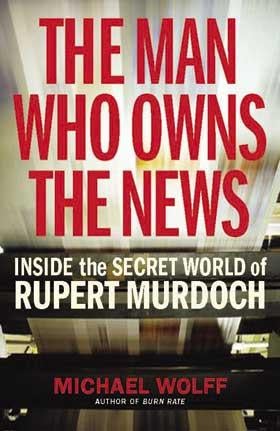
Why the hell was I invited to review this book about Murdoch? writes David Banks.
It’s like asking Fredo to inscribe something tastefully clever and wonderfully witty on Don Corleone’s retirement card. Poor, dumb Fredo.
So was it because I like and admire KRM, the capo di tutti capi whom many of we ex-lieutenants still call “Boss” years after we have departed what biographer Michael Wolff calls “The Family”? Or because I worked for him on three continents and felt fear of him and, occasionally, won and valued his favour?
Poor, dumb Banksy…
After a dozen years working for Murdoch, most of them at his “beloveds” (The Sun, the New York Post and The Australian), I still know little more about what makes “Rosebud” Rupert tick than the average wannabe reporter thinks he knows.
Michael Wolff, however, is more than your average reporter. His credentials – columnist for Vanity Fair and New York Magazine, National Magazine Award winner and successful author –won him 50 hours all-on-tape access. That and the fact that Rupert had just pulled off the deal of his incredible life in buying the Wall Street Journal, and probably wanted to shout about it.
Mystified execs worldwide who were encouraged to permit similar access – Wolff’s credits list reads like a Who’s Who of everyone I ever knew at News Corp – must have wondered secretly: “Why is he doing this?”
Predictably, six weeks before publication after receiving an advance copy of the book (allegedly via son-in-law Matthew Freud who – allegedly again – blagged a copy offered for serialisation to a London newspaper under a non-disclosure agreement) Murdoch has complained of inaccuracies, particularly in regard to his supposed relationship with Fox News boss Roger Ailes and News Corp president Peter Chernin.
But if there is new sensation contained within this undoubtedly well-written opus of 400 A4 pages it eludes me. He is, we “learn”, grumpy, ruthless, hard of hearing, not motivated by money. His older children are “off the wall” (Prudence), “ballsy” (Elisabeth), “uncomplicated” (Lachlan), “a probable successor” (James). The younger ones are “fluent in Mandarin”.
Nevertheless, the story of a media mogul who constantly reinvents himself over 50 years as he parlays his father’s legacy of a single Australian newspaper into a $70bn international corporation is as gripping as it is familiar.
He is a traveller in time and space, a high-flying phone junkie deal-doer who never stops growing . … Adelaide to Fleet Street to Wall Street, newspapers into TV into movies. Nationalities, residences, families: he just ups sticks and sacrifices all to his restless quest for… what, exactly? The question is never really answered. This is as much How the Western Media Was Won as it is Inside the Secret World of Rupert Murdoch.
Admiringly, Wolff attributes Murdoch’s success in the battle for the WSJ to his restless transference of affections and ambitions and to his phenomenal ability to learn. He and Dow Jones, says Wolff, both enter the Eighties as publishers; Murdoch exits the decade as an international businessman and deal-meister.
As a reporter’s record of Rupert’s towering business achievement, Wolff’s is a brilliantly readable contribution. But like most of us, I think he fell for the guy.
Email pged@pressgazette.co.uk to point out mistakes, provide story tips or send in a letter for publication on our "Letters Page" blog
